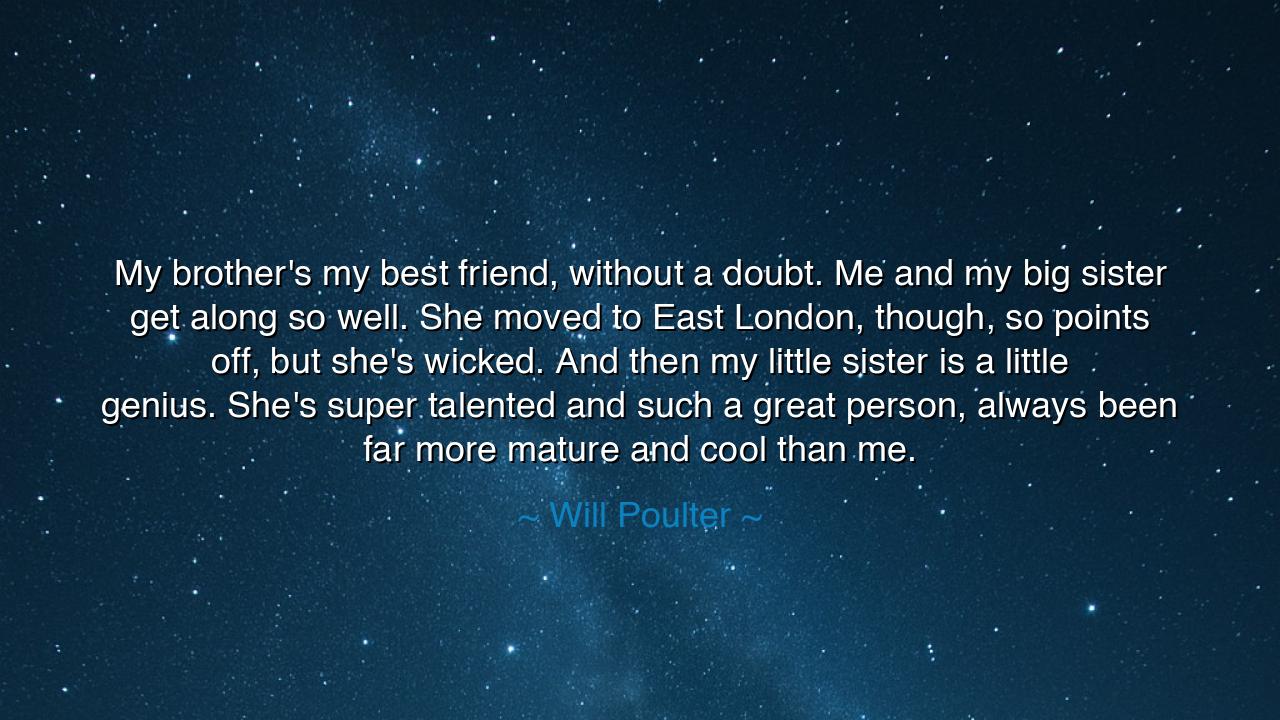
My brother's my best friend, without a doubt. Me and my big
My brother's my best friend, without a doubt. Me and my big sister get along so well. She moved to East London, though, so points off, but she's wicked. And then my little sister is a little genius. She's super talented and such a great person, always been far more mature and cool than me.






"My brother's my best friend, without a doubt. Me and my big sister get along so well. She moved to East London, though, so points off, but she's wicked. And then my little sister is a little genius. She's super talented and such a great person, always been far more mature and cool than me." These words spoken by Will Poulter carry the weight of deep familial love and admiration. In a world that often prizes individual achievement and independence, Poulter’s reflection on his siblings speaks to a universal truth: the profound and unbreakable bonds of family. It is within the family, the first community one encounters in life, where we often find not only the foundation of our identity but the people who shape us in ways we may not even fully realize.
In the ancient world, families were the cornerstone of society. The Romans placed great importance on the concept of familia, which was far more than just a legal term—it encompassed love, duty, and respect for one another. The family was the source of one’s first education, one's values, and one's deepest relationships. Just as Cicero spoke of the importance of the family in creating strong individuals, so too did Socrates emphasize that the first teacher of any person was their own kin. The idea that one could find their best friend within their family was not a novel concept but one rooted in the ancient values of loyalty, mutual respect, and shared experience.
In Poulter’s reflection, we see the ancient truth that siblings are not just companions of childhood but become pillars of support in the journey of life. His relationship with his brother and sister illustrates a reality that spans generations: that within the family, we often find the clearest mirrors to our own character. His admiration for his siblings—his brother being his best friend, his big sister's wickedness, and his little sister's maturity—reflects an acceptance of each family member’s unique qualities. It is an understanding that family members are not meant to be identical; rather, they complement each other, each bringing a special element to the whole.
The connection between siblings is not always perfect. As Will Poulter acknowledges, there may be moments when physical distance, such as his sister moving to East London, creates a sense of longing or separation. This reality mirrors the ancient teachings of family dynamics, where separation often strengthens the bond rather than weakens it. Homer’s epic tales, particularly in The Odyssey, tell the story of Odysseus's longing for his wife Penelope and son Telemachus after years of separation. Their reunion symbolizes not only the strength of familial love but the deep yearning that can grow from being apart. In Poulter’s words, the familial bond is one that persists regardless of physical distance—it is built on trust, affection, and a shared past.
Consider also the ancient role of the eldest sibling in guiding the younger ones. In many cultures, the oldest sibling was considered a protector and a guide. In medieval Europe, the eldest son often inherited the family’s estate, but his duties were not limited to land—he was entrusted with the well-being of his younger siblings. He was the one to pass on wisdom, to teach, and to lead by example. Similarly, Poulter’s relationship with his big sister reflects this dynamic, where the older sibling is not just a family member but a figure of influence and leadership. Despite the physical distance, the bond remains, a testament to the enduring role of the eldest sibling in shaping the family narrative.
Poulter’s admiration for his little sister, calling her a "little genius" and recognizing her as more mature and cool than he is, speaks to an important truth: each sibling offers something unique. The wisdom of the younger generation often goes unnoticed, but the ancients knew that the younger could teach the older just as much as the older could teach the younger. Plato’s dialogues, especially in works like The Republic, show that learning is reciprocal—each person, regardless of age, has something valuable to offer. The dynamic between siblings reflects this mutual growth, where the younger can often lead the way, not through age or experience, but through talent and fresh perspective.
The lesson in Poulter’s words is clear: family is not just a bond of blood but a source of strength, growth, and profound connection. Whether it is the shared laughter of growing up together, the support during times of challenge, or the wisdom passed down through generations, the family remains one of the most important forces in shaping who we are. In the same way that the ancients valued familial ties as the foundation of society, we must recognize the importance of honoring and nurturing our relationships with our siblings, for they are often the ones who understand us best and are there to guide us, challenge us, and celebrate with us.
Thus, the call is clear: cherish your family, for in them lies the strength that carries us through life’s ups and downs. Whether your siblings are near or far, never underestimate the bond you share, for it is one of the greatest treasures you will ever possess. Like the heroes of old, who thrived on the support of their kin, so too should we draw strength and wisdom from the family we have—celebrating the uniqueness of each member, knowing that together, we form a whole greater than the sum of its parts.






AAdministratorAdministrator
Welcome, honored guests. Please leave a comment, we will respond soon